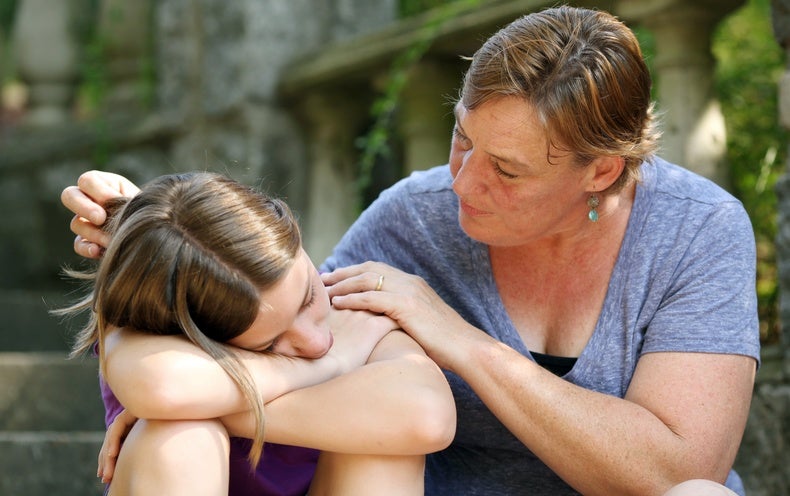
Throughout the COVID-19 pandemic, I’ve been hearing from parents across the country asking how to help their children process grief. Millions of kids are experiencing grief, not just those who know someone who died from the virus.
Death is taking place all around us. Families are suffering. They’re also grieving the loss of businesses, livelihoods, freedoms and a sense of normalcy. And in a broad sense there’s collective grief, felt by a society or a nation. People have lost our sense of safety and connectedness. Children feel all of this, even if they don’t show it outwardly.
Meanwhile, children are also grieving the loss of childhood rites of passage, such as school ceremonies and events, organized sports, sleepovers and simply hanging out with their friends. All these losses take a toll.
One of the most important things we can do to help kids through this is engage in empathetic listening. And it’s a skill that not just parents, but also other caregivers and educators, can develop.
A central goal of empathetic listening is to put yourself, as much as possible, into the speaker’s position to understand their point of view. It’s such an important tool of compassion that some doctors have been trained in it. (In a piece for Scientific American, Gleb Tsipursky called it a “vital skill in promoting trusting relationships.”)
Empathetic listening is a necessity for children, who often feel misunderstood and don’t have the same reservoirs of experience or language to express themselves. But it can also be particularly difficult to provide to them. As adults, our natural tendency is to do a lot of talking when kids share their worries. We want to offer them wisdom from our knowledge and experiences, helping them see that things will be okay.
When children are processing grief, listening is much more productive. They’re generally not looking primarily for solutions or answers. They need a welcoming environment to share their feelings. (University of California professor Gregorio Billikopf Encina called the empathetic approach “listening first aid.” The goal, he wrote, “is to help empty the large reservoirs of emotion, anger, stress, frustration and other negative feelings.”)
LET THE CHILD LEAD THE CONVERSATION
To engage in empathetic listening, it’s often best to start with an open-ended question, such as “How are you feeling about all the changes during this time?” After your child responds, reflect back on what they say, repeating it in your own words. Try saying, “It sounds like you are feeling X,” with “X” being sad, lonely, frightened or whatever they just described. This way, they feel heard and you can get a clearer understanding of what they’re thinking and feeling.
When they stop talking, validate their feelings with phrases such as “It sounds like you are having a really hard time, I know this has been a lot to handle.” And encourage them to keep sharing. Try using phrases such as “Tell me more,” and questions such as “What is that like for you?”
STAY PRESENT
When engaging in active listening, try to stay present by giving the child your full attention as well as your love and affection. It’s a good time to be away from all other potential distractions if possible, such as your phone or work, and perhaps even your other children. Taking a walk individually with each child can be particularly helpful. When they know they have uninterrupted time with you, they’re more likely to open up.
COMMISERATE—UP TO A POINT
It can be helpful to share where your feelings overlap. Say things like, “I feel really lonely and sad too, when I think about not being able to do the things I had planned or seeing my coworkers.” If you’ve lost someone you are both grieving, talk about that person, how much you both miss them, how much the loss hurts. This helps model open communication and shows the child that they’re not alone.
But try to avoid saying things like “I know how you feel.” Inside, everyone’s experience is unique. If you, even unintentionally, send a child the message that your feelings are exactly the same, they may feel pressured to handle those feelings the same way that you are. And they may fear disappointing you in the way they handle their feelings.
For children, this pandemic is a particularly formative experience. It will shape how they see the world. The more we can do to help them learn to handle difficult emotions in a healthy way, the stronger their futures will be. The good news is that in helping children process what they’re feeling, we help ourselves as well. It’s a chance to think through and gain insight into some of what we’re feeling as adults. Through years of experience, I’ve seen how healing the process is for everyone involved.
"need" - Google News
June 18, 2020 at 06:00PM
https://ift.tt/37CDO7E
To Process Grief over COVID-19, Children Need Empathetic Listening - Scientific American
"need" - Google News
https://ift.tt/3c23wne
https://ift.tt/2YsHiXz
Bagikan Berita Ini















0 Response to "To Process Grief over COVID-19, Children Need Empathetic Listening - Scientific American"
Post a Comment